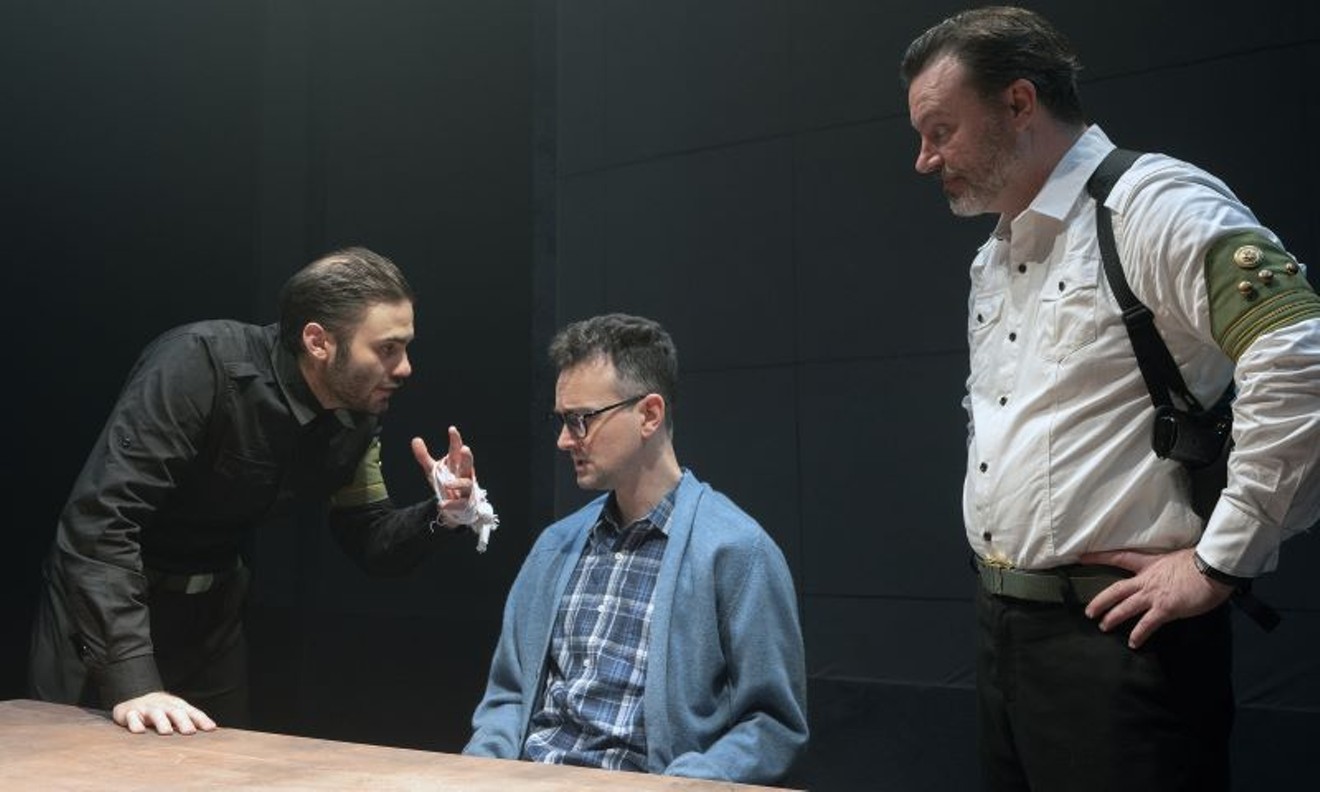Bring an extra layer of clothing to Dirt Dogs Theatre because Martin McDonagh's The Pillowman is as cold and bleak as Satan's Lake Cocytus in Dante's Inferno. This is nightmare territory – harsh, unforgiving, terrifying – a contemporary take on the Brothers Grimm, Edgar Allan Poe, and wisps of Kafka. I'm not aware of a creepier play with such an odd mix of ebony-black comedy, police state horrors, intertwined with grisly fairy tales.
It is one-of-a-kind, and under Malinda L. Beckham's fierce direction, John Baker's pin-spot lighting, Santiago Sepeda's industrial foreboding gray wall, and most importantly Cory Sinclair's (a.k.a. Hescher's) enveloping sound design and superb music score, Dirt Dogs delivers a chilling production that will make you think twice about laying your head upon that fluffy little cushion tonight – maybe even nights to come.
Master Irish/British playwright McDonagh (The Beauty Queen of Leenane, 1996; The Lieutenant of Inishmore, 2001; A Behanding in Spokane, 2010) wrote and directed the Academy Award-winning Best Live Action Short, Six Shooter, 2004; and has written and directed the iconic films In Bruges (2008), Seven Psychopaths (2012), Three Billboards Outside Ebbing, Missouri (2017), and The Banshees of Inisherin (2022).
His Tony and Oscar Award-nominated dark, dark comedies feature psychos, torture, disfigurement, mutilation, and psychic mayhem. His quirky violence is often compared to Quentin Tarantino and his sardonic wordplay to Samuel Beckett, but McDonagh stands alone with his baroque style of storytelling and his fanciful tales that seem to spring from an unbridled and wicked id.
Pillowman (2003) is Ur-McDonagh. A tale within a fairy tale that blisters while it unfolds. You don't know what will happen next, and you wait in dread for what might come. What follows is unexpected and worse than you could imagine.
In an unnamed authoritarian police state, writer Katurian K. Katurian (Cory Sinclair), is being interrogated by sadistic policeman Ariel (Kyle Clark) and equally brutal detective Tupolski (William Giffen). A series of horrific child murders have occurred which suspiciously echo his unpublished stories. Katurian works in an abattoir but aches to be a writer. He has over 400 grisly little tales that have been taken into evidence by the police. One child has been murdered by swallowing apples laced with razor blades, like his story “The Little Apple Men;” one boy has had his toes chopped off and bled to death, like his Piped Piper story, “The Tale of the Town on the River;” and one young victim has yet to be discovered. Apparently, she's been crucified and then buried alive, which parallels his story, “The Little Jesus.”
Katurian's developmentally-challenged brother Michal (Curtis Barber) has also been arrested and is being tortured in the next room to coax his confession and probably implicate Katurian. The police have found not only Katurian's bizarre stories, but a box containing five little toes. This is not going to be a good day.
Cat-like, McDonagh plays with us as if we were a trapped mouse. He bats us about, pauses to let us catch our breath, and then bats us about again. He feeds us information a bit at a time, like the story of Katurian's parents and how they raised their two sons. In a gruesome sadistic experiment in how not to raise children, they heap praise upon young Katurian and encourage him to write, while at the same time torture and abuse young Michal to see how he will grow up when offered no love. Needless to say, both children become warped beyond redemption.
The drama circles back, feeds off itself, and leads inexorably to more death and murder. Everyone tells stories. The play's heart is in its storytelling. Fables, reminiscences, and lies are all part of them. Everyone makes sense of his senseless life the best he can. Katurian's stories evolved from painful childhood memories; Michal has stories, too, awful and twisted, but he'd rather listen to Katurian's. The policemen tell stories, but they have their own vaudeville comic routine of good cop/bad cop that interrupts the telling. Everyone's a Scheherazade. None more so than McDonagh, who intrigues us every moment with his gallery of grotesques. Everything's a bit off balance, not what it seems. Dank and dark, he hypnotizes.
The utter surprise of the night is Sinclair. Not only is his score an electric pulse that echoes with churchly presence and vibrant thrum throughout, it galvanizes the drama, adds to it and solidifies the creepy atmosphere. But he's also a superb actor. His Katurian couldn't be more subservient, then defiant, then battered. His reedy voice is perfect when he has to bow down to his captors, or whisper compassion to his brother, or tell his tales. He's twitchy, and slightly neurotic, always looking over his shoulder. He's perfect in the role. And when you can write music for your own character, there's nothing better, is there?
Clark has another of his who-is-that? performances. He can morph into anyone and we don't recognize him. Remember his psychotic Bobby Reyburn in Dirt Dogs' Coyote on a Fence, or his utterly uncontrollable jerk Peter in Rec Room's Heroes of the Fourth Turning? He's all terror and bluster as Ariel – only McDonagh would name such a vicious character after the sprite in Shakespeare's Tempest – but his character's own blighted childhood saves Katurian's stories for a future life. He's the one who figures out who the murderer is. Even sadistic bullies have a soft heart, once.
Giffen's Tupolski is just as gruff and mean as Ariel, but he plays it smooth and oily. He is the lead detective on the case after all, and he can't blow it or his life is on the line. He overlays Tupolski with a dry reading like a straight man in a vaudeville comedy duo, which he is. His stoic performance with its wry undertones is the perfect complement to McDonagh's wicked wit.
Barber's Michal is childhood innocence personified, if that childhood path had been plowed so crooked. He is mired at seven years old, loves his brother, and sees nothing wrong with killing children because that's what his brother does in his stories. He's like the Pillowman, a creature made out of pillows, who convinces those who will have a horrible future to kill themselves now while they are still young and good. He's an angel of death, wide-eyed yet amoral. After all he's been through, can we blame him? Can we forgive him? Katurian knows what to do.
McDonagh's tale is mighty inky, filled with a vengeful but one-time forgiving Piped Piper, a religious fanatic who thinks she's Jesus, virile policemen with abuse issues, and a protagonist whose own childhood is filled with horror. There's not much brightness in The Pillowman, but its comic gloom somehow becomes almost illuminating. Bring a sweater, and keep a nightlight on.
The Pillowman continues through March 23 at 7:30 p.m. Thursdays, Fridays, Saturdays, and Monday, March 18, Industry Night; and 2 p.m. Sundays at Dirt Dogs Theatre Co., at MATCH, 3400 Main. For more information, call 713-521-4533 or visit dirtdogstheatre.org. $30.
Support Us
Houston's independent source of
local news and culture
account
- Welcome,
Insider - Login
- My Account
- My Newsletters
- Contribute
- Contact Us
- Sign out

Kyle Clark as Ariel, Cory Sinclair as Katurian, Bill Giffen as Tupolski in The Pillowman.
Photo by Gary Griffin
[
{
"name": "Related Stories / Support Us Combo",
"component": "11591218",
"insertPoint": "4",
"requiredCountToDisplay": "4"
},{
"name": "Air - Billboard - Inline Content",
"component": "11591214",
"insertPoint": "2/3",
"requiredCountToDisplay": "7"
},{
"name": "R1 - Beta - Mobile Only",
"component": "12287027",
"insertPoint": "8",
"requiredCountToDisplay": "8"
},{
"name": "Air - MediumRectangle - Inline Content - Mobile Display Size 2",
"component": "11591215",
"insertPoint": "12",
"requiredCountToDisplay": "12"
},{
"name": "Air - MediumRectangle - Inline Content - Mobile Display Size 2",
"component": "11591215",
"insertPoint": "4th",
"startingPoint": "16",
"requiredCountToDisplay": "12"
}
]
KEEP THE HOUSTON PRESS FREE...
Since we started the Houston Press, it has been defined as the free, independent voice of Houston, and we'd like to keep it that way. With local media under siege, it's more important than ever for us to rally support behind funding our local journalism. You can help by participating in our "I Support" program, allowing us to keep offering readers access to our incisive coverage of local news, food and culture with no paywalls.
D.L. Groover has contributed to countless reputable publications including the Houston Press since 2003. His theater criticism has earned him a national award from the Association of Alternative Newsmedia (AAN) as well as three statewide Lone Star Press Awards for the same. He's co-author of the irreverent appreciation, Skeletons from the Opera Closet (St. Martin's Press), now in its fourth printing.
Contact:
D. L. Groover
Trending Arts & Culture
- Doctor Who: Scared Silly
- The 10 Best And Most Controversial Hustler Magazine Covers Ever (NSFW)
- Top Five: Porn Stars We Follow on Twitter
-
Sponsored Content From: [%sponsoredBy%]
[%title%]

Don't Miss Out
SIGN UP for the latest
arts & culture
news, free stuff and more!
Become a member to support the independent voice of Houston
and help keep the future of the Houston Press FREE
Use of this website constitutes acceptance of our
terms of use,
our cookies policy, and our
privacy policy
The Houston Press may earn a portion of sales from products & services purchased through links on our site from our
affiliate partners.
©2024
Houston Press, LP. All rights reserved.





